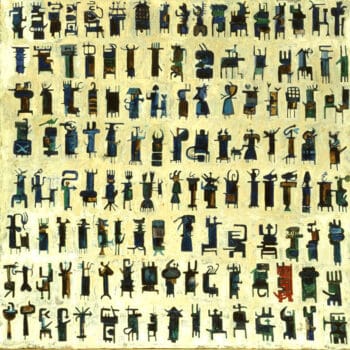Dear friends,
Greetings from the desk of Tricontinental: Institute for Social Research.

Lucía Chiriboga (Ecuador), Untitled from the series ‘Del fondo de la memoria, vengo’ (‘I Come from the Depths of Memory’), 1993.
We live in dishonest times, where certainties have crumbled, and malevolence stalks the landscape. There is Gaza, of course. Gaza above all else is on our minds. Over 33,000 Palestinians have been killed by Israel since 7 October, with more than 7,000 people missing (5,000 of them children). The Israeli government has brutally disregarded the global public opinion mounted against them. Billions of people are outraged by the stark fact of their violence and yet we are unable to force a ceasefire from an army that has decided to raze an entire people. Global North governments speak from two sides of their mouths: clichéd phrases of concern to ameliorate their own disheartened populations, and then vetoes at the United Nations and arms transfers to the Israeli army. It is this two-faced behaviour that bolsters the confidence of people like Israeli Prime Minister Benjamin Netanyahu and enables their impunity.
That same impunity allowed Israel to violate the UN Charter (1945) and Vienna Convention on Diplomatic Relations (1961) on 1 April 2024 when it bombed the Iranian embassy in Damascus, Syria, killing sixteen people—including senior Iranian military officers. This impunity is infectious, spreading amongst leaders who feel emboldened by Washington’s arrogance. Among them is Ecuador’s President Daniel Noboa, who sent his paramilitary forces into the Mexican embassy in Quito on 5 April to seize the country’s former Vice President Jorge Glas, who had been granted political asylum by the Mexican authorities. Noboa’s government, like Netanyahu’s, set aside the long history of international respect for diplomatic relations with scant regard for the dangerous implications of this kind of action. There is a feeling amongst leaders such as Netanyahu and Noboa that they can get away with anything because they are protected by the Global North, which anyway gets away with everything.
Diplomatic customs go back hundreds of thousands of years and across cultures and continents. Ancient texts written by Zhuang Zhou in China and his contemporary in India, Kautilya, in the fourth century BCE set the terms for honourable relationships between states through their emissaries. These terms appear in almost every region of the world, with evidence of conflicts resulting in agreements that include the exchange of envoys to maintain peace. These ideas from the ancient world, including Roman law, influenced the early European writers of customary international law: Hugo Grotius (1583—1645), Cornelis van Bijnkershoek (1673—1743), and Emer de Vattel (1714—1767). It was this global understanding of the necessity of diplomatic courtesy that formed the idea of diplomatic immunity.

Safwan Dahoul (Syria), Dream 77, 2014.
In 1952, the government of Yugoslavia proposed that the International Law Commission (ILC), set up by the UN, codify diplomatic relations. To assist the ILC, the UN appointed Emil Sandström, a Swedish lawyer who had chaired the UN Special Committee on Palestine (1947), as special rapporteur. The ILC, with Sandström’s assistance, drafted articles on diplomatic relations, which were studied and amended by the 81 member states of the UN. At a month-long meeting in Vienna in 1961, all the member states participated in the Convention on Diplomatic Relations. Amongst the 61 states that became signatories were Ecuador and Israel, as well as the United States. All three countries are, therefore, among the founding states of the 1961 Vienna Convention.
Article 22.1 of the Vienna Convention says: ‘The premises of the mission shall be inviolable. The agents of the receiving State may not enter them, except with the consent of the head of the mission’.
At a briefing in the UN Security Council about Israel’s recent strike on the Iranian embassy in Syria, Deputy Ambassador Geng Shuang of China reminded his colleagues that 25 years ago, the U.S.-led NATO bombing of Yugoslavia resulted in an attack on the Chinese embassy in Belgrade. At the time, U.S. President Bill Clinton apologised for the attack, calling it an ‘isolated, tragic event’. No such apology has come from Israel or Ecuador for their violations of the Iranian and Mexican embassies. Geng Shuang told the chamber, ‘The red line of international law and the basic norms of international relations have been breached time and again. And the moral bottom line of human conscience has also been crushed time and again’. At that briefing, Ecuador’s Ambassador José De la Gasca condemned the attack on the Iranian embassy in Damascus. ‘Nothing justifies these types of attacks’, he said. A few days later, his government violated the 1961 Vienna Convention and the 1954 Organisation of American States’ Convention on Diplomatic Asylum when it arrested Jorge Glas in the Mexican embassy, an act that was swiftly condemned by the UN secretary-general.
Such violations of embassy protections are not new. There are many examples of radical groups—from the left and the right—attacking embassies to make a political point. This includes the 1979 takeover of the U.S. embassy in Tehran, when students held 53 staff hostage for 444 days. But there are also several examples of governments forcibly entering the premises of foreign embassies, such as in 1985 when the South African apartheid regime sent its forces to the Dutch embassy to arrest a Dutch national who had assisted the African National Congress and in 1989 when the invading U.S. army searched the residence of the Nicaraguan ambassador in Panama City. None of these interventions went by without sanction and a demand for an apology. Neither Israel nor Ecuador, however—both signatories of the 1961 Vienna Convention—have made any gesture towards an apology. Neither Iran nor Syria had any diplomatic relations with Israel, and Mexico broke diplomatic ties with Ecuador in the wake of recent events.

Graciela Iturbide (Mexico), Mujer Ángel, Desierto de Sonora, México (‘Angel Woman, Sonoran Desert, Mexico’), 1979.
Violence traverses the world like a new pandemic not only in Gaza, but spreading outward to this brewing conflict around Ecuador and the ugliness of the wars in the eastern Democratic Republic of the Congo, Sudan, and the continuing stalemate in Ukraine. War breaks the human spirit, but it also invokes an enormous instinct to go the streets and stop the trigger from being pulled. Again and again, this great anti-war feeling is met with the wrath of powers that arrest the peacemakers and treat them—and not the merchants of death—as the criminals.
Iran has a glorious tradition of poetry that goes back to Abu Abdallah Rudaki (858—941) and then shines in the Diwan of Khwaja Shams al-Din Muhammad Hafiz Shirazi (1320—1390), who gave us this bitter thought: in the world of dust, no human being shines; it is necessary to build another world, to make a new Adam.
In this tradition of Farsi poetry comes Garous Abdolmalekian (b. 1980), whose poems are saturated with war and its impact. But, even amidst the bullets and the tanks sits the powerful desire for peace and love, as in his ‘Poem for Stillness’ (2020):
He stirs his tea with a gun barrel
He solves the puzzle with a gun barrel
He scratches his thoughts with a gun barrelAnd sometimes
he sits facing himself
and pulls bullet-memories
out of his brainParviz Tanavoli (Iran), Last Poet of Iran, 1968.
He’s fought in many wars
but is no match for his own despairThese white pills
have left him so colourless
his shadow must stand up
to fetch him waterWe ought to accept
that no soldier
has ever returned
from war
alive
Warmly,
Vijay


